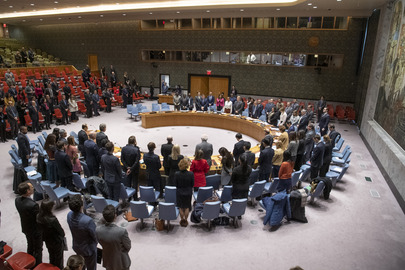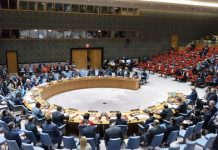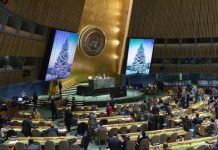Olukemi Ibikunle took a deep breath. The job fit her to a T but would take her far from her family in Lagos, Nigeria. Then the 38-year-old project manager did what any meticulous planner would: she called home.
“I spoke to my husband, and he said, ‘Why are you asking me? Go, go, go! Tell them yes!’”
His enthusiasm heartened her. But how could he manage all by himself, she argued. Their two children were only seven and 10. He countered with a single, disarming question. “These children you’re talking about…can you tell me their surname?” She did. “That’s my name,” he replied. “Leave them with me.”
Olukemi Ibikunle, 43, a corrections officer from Nigeria, is the 2025 laureate of the United Nations Trailblazer Award for Women Justice and Corrections Officers.
Architect of dignity
The year was 2020, and Kemi, as she is known, had made herself indispensable within Nigeria’s prison service.
When a roof leaked, a wall buckled, or a block had to be designed from scratch, she was the person people called. In Lagos State, she oversaw five custodial centers holding nearly 9,000 detainees – not a small feat in a field still largely dominated by men.
The work was pitilessly specific, the kind that played to the strengths of the no-nonsense geologist by training: no glass windows or ceramic basins that could shatter into weapons; reinforced bars for light without risk.
“We bring the balance between respect for the dignity of persons and security,” she said. Even in a prison block, toilets must have privacy. “We use what we call a ‘dwarf door’: I can see your feet and it’s covered up just to your neck, so I can know if you’re trying to commit suicide.”
That balance was exactly what the UN was looking for. MONUSCO, its peacekeeping operation in the DRC, wanted someone who could walk the line between safety and human rights. “Competence doesn’t have gender,” she said, speaking with the calm of someone who has watched concrete set in real time.
Kemi landed in Kinshasa, the Congolese capital, with a remit that on paper sounded administrative: to help reform the country’s ailing prison system. In practice, it meant redesigning the everyday landscape of incarceration in a post-conflict State – pipe by pipe, door by door.
Changing minds
Prison reform, she knew, had to start with floor plans. MONUSCO’s corrections team sat down with national authorities to make the case for the Mandela Rules and Bangkok Rules – international standards calling for humane treatment of prisoners and gender-sensitive detention practices. But they were met with resistance and a narrow view of what a prison could be.
“They didn’t see why we needed to include a library or a workshop in the design,” Kemi recalled. So she tried a different tack. When prisons have sports centres, she explained, inmates are healthier because they exercise their bodies. “And with a library,” she added, “they can spend their time reading instead of thinking about how to break out.”
The message eventually sank in. She and her colleagues drafted a blueprint for new facilities nationwide and mapped the existing ones, deciding which to rehabilitate and which to write off.
Along the way, she insisted on building separate prisons for women. “Don’t just have a female block in a male prison,” she said – that’s a recipe for exposing women to sexual exploitation and violence. When complete separation wasn’t possible, she pushed for fences and independent hallways.
Olukemi Ibikunle (center) organizes a tailoring workshop to support the reintegration of female detainees in eastern Democratic Republic of the Congo (DRC).
Breaking the mould
In the field, at first, Kemi brushed off the ritual sexist comments. Who was this “short girl” who wanted to see receipts, inspect rebar, question the sand-to-cement ratio, and verify the workers’ qualifications?
Her native Yoruba – and even her Nigerian English – were of no help. She picked up the technical French on the fly – armatures, agglo, dalles – and used the Congolese pricing repertoire to deflate padded bids. “This is overrated,” she would say. “We can cut down this budget.”
One site was supposed to have air conditioning throughout, but the builder showed up with standing fans. “I brought out the project document… trois climatiseurs,” she recalled, tracing a line in the air, the way she had then, with her pen. Case closed. Eventually, when contractors called Kinshasa to complain, they got the same answer: “Talk to Kemi.”
When the rebels came
By 2023, Kemi had been deployed east, to the province of South Kivu. In the city of Kabare, she oversaw the construction of an $850,000 high-security facility designed to hold “difficult people,” many linked to armed groups. It was a large-scale project. She supervised the site day after day, commuting 20 kilometers each way from Bukavu, the provincial capital.
Then, in January, the M23 militia launched a major offensive in the area. Under an agreement with Kinshasa, MONUSCO had withdrawn its peacekeepers from South Kivu the previous year, leaving only its corrections team in place.
UN troops remained stationed solely in the nearby provinces of North Kivu and Ituri. By the time the Tutsi-led rebels reached Bukavu’s outskirts, Kemi was the only one left from the mission.
The evacuation of foreign personnel was chaotic. “We had to go through land borders without any UN logistics, each person finding their own way out, somehow,” she said.
M23 fighters, backed by neighboring Rwanda – although Kigali has repeatedly denied this – had seized control of Lake Kivu, making navigation impossible. With only a backpack to her name, she caught a ride with two human-rights colleagues just before the city fell.
Along the way, her husband kept messaging her on WhatsApp: Where are you? Are you okay? So as not to worry him, she replied simply, “I’m fine.” Only now does she allow herself to look back on that moment. “It was a scary period…the few of us who remained, we became like family.”
At the Rwandan border, the uniform on her photo ID drew a harder stare. “They looked at it and said, ‘You’re police.’ I said, ‘No, I’m not police; I’m correctional.’ They said, ‘It’s the same – you’re police!’” She was pulled aside for questioning. Calls were made. Then more calls. Eventually, she was let through.
Now stationed in Beni, a city still under Government control in North Kivu, she continues her work with MONUSCO’s corrections team. The large prison project she once oversaw in Kabare, however, remains on standby.
Olukemi Ibikunle (center) supervises the construction of a prison in eastern Democratic Republic of the Congo (DRC).
A trailblazer’s recognition
This week, Kemi’s work is receiving international recognition as the 2025 winner of the UN Trailblazer Award for Women Justice and Corrections Officers – an honour that celebrates women who break gender barriers in peace operations and redefine what leadership looks like behind prison walls.
By the time I met her at UN Headquarters on the eve of Wednesday’s ceremony, she was already something of a local celebrity.
On the way to our interview, a UN security guard – a fellow Yoruba – recognized her at once and came over to congratulate her.
Uvira: Where waste became fuel
The stories she talks about most vividly predate the M23 turmoil — tangible projects that quietly transformed life behind bars.
One stands out: the biogas system she helped launch in 2021 at Uvira Prison, in South Kivu, where human waste was turned into cooking gas. Kitchen fires no longer fed on forests. Sewage stopped bursting through cracked pipes. “No more odour,” she said.
Her team trained officers and long-term detainees to maintain the system. After MONUSCO’s withdrawal from the province, water deliveries stopped; a borehole was funded from afar and monitored through shaky video calls.
In 2024, she made the eight-hour drive to see for herself. “My joy was that the biogas system was still working…Three and a half years later, everything was like the way we left it.”
The officers told her the installation was “tamper-proof” and largely self-sustaining. The line that stayed with her came like a benediction: “This is the best thing you have done for us.”
The female inmates of Bukavu
Another memory – almost trivial in cost but immense in meaning – came from the Bukavu prison, which held 80 women and more than 1,400 men. Each morning, sacks of food went to the men. The women, she said, simply got “nothing.” Officials told her their families brought them meals and charities filled the gaps. Why spend the prison’s ration on them?
Then there was the kitchen itself: a ruin of soot and broken stoves, each woman cooking over a single charcoal flame. Kemi wouldn’t have it. She scraped together $2,000 from leftover budget lines, bought pots and bowls, hired a technician, and stood beside him until the kitchen drew breath again.
But the real battle was bureaucratic. She went to the prison chief and argued that the Government provided food for every prisoner – not just for men.
For two weeks straight, she showed up at 7am to make sure the rations were shared fairly. She watched the beans being measured out, nudging the portion from one bucket to two, then three, until fairness became routine. “Eventually,” she said, “it became a norm: in the morning, men get their food – and women get also.”
If the women couldn’t thank her aloud, they did it silently – a small, wordless thumbs-up each time she stepped into the yard.
The cost of leaving
During her missions, Kemi never stops being a mother, staying close to her children through long-distance video calls. “We talk on WhatsApp,” she said. “On their way to school they always call. Even on my flight here, I had Wi-Fi, so I was able to communicate with them.” In Lagos, her husband works from home, keeping the family’s rhythm intact.
When she first left for the DRC, her seven-year-old son played it cool. “You’re leaving tomorrow? Okay, see you,” he said, while his older sister clung to her, asking for “five more minutes.”
But after the chaos of her evacuation from Bukavu, the boy – now a teenager – dropped the act. He broke down in tears. “You can just come home,” he told her. “You don’t need to work. Daddy will take care of us.” She smiled and gave him the only answer she knows: “It’s not just about money. It’s about doing something for myself – and for you.”
Deputy Secretary-General Amina J. Mohammed (right) presents the Trailblazer Award to the 2025 winner Olukemi Ibikunle, a correctional officer from Nigeria deployed to MONUSCO.
The smallest details
Kemi often returns to the same guiding principle: that dignity lies in the smallest details – a dwarf door, a kitchen pot, a pipe that doesn’t burst.
This Wednesday in New York, she walked onto a stage to receive the Trailblazer Award. For a few ceremonial minutes, she was visible – the applause, the photographs, the quoted lines.
But afterwards, she will return to the quiet work that defines her: the blueprint, the ledger, the early-morning checks – and the long, stubborn labour of proving, one repaired kitchen and one quiet library at a time, that peace begins behind prison walls.
Source of original article: United Nations (news.un.org). Photo credit: UN. The content of this article does not necessarily reflect the views or opinion of Global Diaspora News (www.globaldiasporanews.com).
To submit your press release: (https://www.globaldiasporanews.com/pr).
To advertise on Global Diaspora News: (www.globaldiasporanews.com/ads).
Sign up to Global Diaspora News newsletter (https://www.globaldiasporanews.com/newsletter/) to start receiving updates and opportunities directly in your email inbox for free.
































